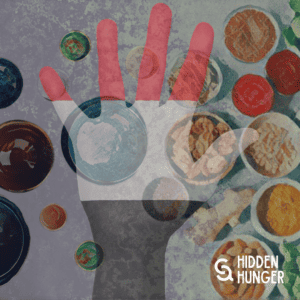 One of the most devastating food crises in the world is mainly out-of-sight-out-of-mind for Americans. Most Americans probably could not easily find Yemen on a map, let alone know about the devastating impact of ongoing war and civil violence. Yemen is a small country neighboring Saudi Arabia and the United Arab Emirates in the Arabian Peninsula, across the Gulf of Aden from Somalia. Consumed by civil war since 2014, Yemen’s people suffer from an escalating food crisis now entering its ninth year.
One of the most devastating food crises in the world is mainly out-of-sight-out-of-mind for Americans. Most Americans probably could not easily find Yemen on a map, let alone know about the devastating impact of ongoing war and civil violence. Yemen is a small country neighboring Saudi Arabia and the United Arab Emirates in the Arabian Peninsula, across the Gulf of Aden from Somalia. Consumed by civil war since 2014, Yemen’s people suffer from an escalating food crisis now entering its ninth year.
How bad is the problem? The World Health Organization, World Food Program, and UNICEF have called Yemen the “world’s largest humanitarian crisis.” Hunger and malnutrition are significant factors in the crisis. Consider the following: More than 17.2 million people in Yemen are food-insecure. More than two million children under 5 years of age have acute malnutrition, and over 500,000 suffer from life-threatening severe acute malnutrition. More than 10,200 children have died or been injured throughout the war, many due to malnutrition. Before the war, access to food was difficult because Yemen imported 90 percent of its food supply. With the war, the lack of food has turned into an emergency.
How did the situation get to be so severe? The region has a geopolitical history that affects the conflict. In 1990, two countries—the Yemen Arab Republic in the north and the People’s Democratic Republic of Yemen in the south—were unified into a single country. The civil war stems partly from unresolved issues with the unification, which came back to the surface during the Arab Spring, when revolutionary protests led to the ouster of then-President Ali Abdullah Saleh. Tensions erupted into war a few years later. The mechanisms of the war have also exacerbated the food crisis. A Saudi-led blockade has prevented needed resources from entering the country, including humanitarian aid and the necessary fuel required to move resources to where they are needed inside the country. Internally, road closures, danger, and infrastructure destruction also prevent aid from flowing to the highest-need areas. Yemen was already poor before the war, with almost half of Yemenis living under the poverty line. With the conflict, that number climbed to around 8 percent.
This story also has another dimension that hits closer to home for Americans: The Yemeni civil war is a proxy war, and the United States is involved. To secure Saudi Arabian support for its regional interests, the United States provided logistical support and intelligence sharing. As a result, Saudi Arabia and its coalition partners, including the United States, supported Yemeni then-President Abdrabbuh Mansur Hadi. Iran, on the other hand, sides with the Houthi militias and southern separatists.
Given the United States’ involvement, why don’t Americans know about this crisis? Our government has contributed arms and military support to the Saudi coalition over the years of the conflict. The key issues boil down to this: What happens in Yemen makes very little difference to Americans’ daily lives, economic resources, and safety. Yemen is seven time zones away from New York, which allows for a general lack of social connection between Americans and Yemenis. Of the 7 million Yemenis living outside Yemen, only around 200,000 live in the United States, most of them in limited geographical regions in New York, the Rust Belt, and California—most Americans have never met someone from Yemen. Of the almost 5 million Yemenis displaced by this war, the United States has accepted a paltry 50 or so refugees. What does all this mean? Americans pay attention to many places and people, but not Yemen.
How might Christians respond to this conflict? Jesus went to the least powerful. Fish and bread multiplied in his hands, and he fed thousands. He provided for the hungry, and he called us to do the same. Jesus made his expectation explicit in Matthew 25: “Then the king will say to those on his right, ‘Come, you who are blessed by my Father, inherit the kingdom prepared for you from the foundation of the world. For I was hungry, and you gave me food, I was thirsty, and you gave me something to drink; I was a stranger, and you invited me in.” Jesus continued and explained that when Christians feed the hungry, it is as if they were feeding him: “Just as you did it for one of the least of these brothers or sisters of mine, you did it for me.”
To be sure, some people and governments are responding to our Yemeni brothers and sisters. More than 100 national and international organizations have signed a letter urging Congress to end American involvement in the war. The Yemen War Powers Resolution, passed by the House and Senate, and vetoed by then-President Donald Trump, sought to do just that—to withdraw the United States from the war. That piece of legislation may come up for consideration again.
There is also a robust NGO response to the needs in Yemen. The United Nations World Food Programme’s (WFP) response in Yemen is currently the largest mobilization in any country, serving millions of people each month. But the WFP faces funding shortfalls and restrictions on humanitarian access and mobility to areas in need.
The parties agreed to a truce in 2022, stopping offensive military attacks, opening ports to receive fuel shipments, and opening the airport for commercial flights. Many of these provisions are still being observed in 2023, although the official time frame for the truce expired months ago. Of course the truce should be celebrated, but the underlying issues have not been addressed, so the war could always break out again. Meanwhile, the devastation of Yemeni hunger remains hidden from most Americans.
Resources:
- CMEP on Yemen: https://cmep.org/issues/yemen/
- UNICEF: https://www.unicef.org/emergencies/yemen-crisis
- World Vision: https://www.worldvision.org/disaster-relief-news-stories/yemen-war-facts#fast-facts
- WFP Page: https://www.wfp.org/emergencies/yemen-emergency#:~:text=Malnutrition%20rates%20among%20women%20and,requiring%20treatment%20for%20acute%20malnutrition.
- WFP Emergency Dashboard: https://www.wfp.org/publications/yemen
- WFP Sit Reports: https://www.wfp.org/publications/yemen-0
- UN story: https://news.un.org/en/story/2022/03/1113852
- Wiki: https://en.wikipedia.org/wiki/Famine_in_Yemen_(2016%E2%80%93present)
- CFR: https://www.cfr.org/backgrounder/yemen-crisis
 Rev. Dr. Mae Elise Cannon is the executive director of Churches for Middle East Peace (CMEP) and is an ordained pastor in the Evangelical Covenant Church (ECC). Christians for Social Action (CSA) is a member of Churches for Middle East Peace.
Rev. Dr. Mae Elise Cannon is the executive director of Churches for Middle East Peace (CMEP) and is an ordained pastor in the Evangelical Covenant Church (ECC). Christians for Social Action (CSA) is a member of Churches for Middle East Peace.


